Her eyebrows raised and she gave me another of those oddball expressions I couldn’t quite decipher. “Kid? You wouldn’t know one if it hit you.”
“How old are you, sugar?”
“Old enough to know better than play gal Friday for you.”
“You didn’t have to come.”
“Mr. Kelly, I wouldn’t miss being with you for the world. You know what the rumormongers are putting out in our sewing circle?”
I turned my head and looked at her. “Tell me.”
“There’s something deep and dark about you. Dick Lagen has hinted at the worst sort of things and Mona Merriman seems to think you were the consort of a certain young lady who’s father was the deputy dictator of one of those new countries... who was shot to death shortly thereafter.”
“Ah, fame,” I said.
“Are those things true?” She was staring straight ahead through the windshield, her hands clasped in her lap.
“If they are, you’ll read about it in their papers soon enough.”
“You don’t seem very concerned.”
“I quit worrying a long time ago, doll.”
For a mile or so she didn’t speak, then she squirmed in her seat and I could feel her eyes on me. “What’s the matter with Lee then?”
I shrugged my shoulders and took the turnoff going east. “Nothing.”
“Dog... he’s scared to death. He looks at you like... like you’re going to explode or something.”
“You know Lee.”
“Not that well, but enough to know he’s never been like that before.” She stopped a moment, then: “It has to do with the other day, doesn’t it? I mean, about those two men. There was a piece in the News ...”
“Coincidence.”
“It was on television, too. They said they were attacked and... mutilated. The police were following up leads.”
“I know. They contacted me.”
“And?”
“I couldn’t help them out. So they left.”
“Dog... they contacted me, too. I... told them we were there...”
I reached over and squeezed her knee. “You did right, honey. What’s there to hide? New York’s a big town. Anything can happen. We just happened to be there when it did.”
“Dog...”
“Look, you know how long I was gone... about a minute and a half. You think I could attack and mutilate two big guys and come out of it without a scratch?”
Her answer was a long time coming. She was remembering the blood on my shirt. “I don’t know,” she said softly.
I let out a laugh. “You flatter me, baby.” Sharon grinned back and flopped back against the cushions.
Up ahead the outline of Linton showed above the tree-line, and the quadruple smokestacks that marked the Barrin factory reared their fingers toward the sky. Three of them were dormant. The fourth was gasping out a thin wisp of gray pollutant. If Linton reflected the economy of the Barrin Industries, it wasn’t a very thriving town.
We cut through the center of the city and took the road that circled the vast factory site. The old-fashioned brick, the archaic tower and the climbing vines made the place look more like a college than a commercial complex. The one-hundred-fifty-year-old clock still kept the right time and the acres of land inside the low wall were well trimmed, but empty of the stacked materials that used to clutter the place. A steady throbbing came from inside the place and occasionally a figure would cross behind one of the windows, otherwise activity was at a minimum. About fifty cars were aligned in the parking spaces. One was directly in front of the main office entrance, even with the No Parking sign. The make and color were familiar and I looked at it again, but the question was answered when Cross McMillan stepped out of the doors, two others trailing him, and glanced around with the air of a person about to take possession.
“Your friend,” Sharon said. “I wonder what he’s doing there.”
“He thinks he’s going to take over the joint.” I laid on the gas and pulled out of sight of the entrance. “He’d better not get too smug about it.”
“Maybe he has reason to be. The McMillan family never was known for their humility. They always were pirates.”
“They never went up against big guns before.”
Again, a furrow appeared between her eyes and she took the edge of her lower lip between her teeth. “What’s happening, Dog?”
“The bastard wants it all. He’s always wanted Barrin ever since the run-in with the old man.”
“He’s forced out everybody else around here.”
“Not everybody, kid,” I told her quietly.
“You think he can’t get” — she swept her hand toward the factory site — “...all this?”
“Not without one hell of a fight.”
“Your cousins aren’t capable...”
“I’m not talking about my cousins.”
“Who are you, Dog?” Her voice had a quiver to it.
“Just a guy who wants to come home.”
“Is that all?”
“Nobody wants to let me,” I said.
“But they can’t keep you out.”
“Not anymore, kitten.”
I turned onto the intersection that angled back into town and crisscrossed the area until I came to the comer of Bergan and High streets. Time had washed over the section leaving the scars of fading paint and crumbling bricks, but Tod’s Club still stood defiantly, one of the earlier buildings structured with materials and skill old-fashioned enough to withstand the deteriorating effects of season after season and almost total neglect.
Once it had been the hub of nearly all the political and social activity that went on and twice the site where heavyweight contenders trained for the big bout. One of them even won the crown. Now, half the ground floor frontage was occupied by neighborhood stores to pay the upkeep and a shoddy frame warehouse took up the space where the half-acre picnic grounds used to be.
We parked outside the entrance and I helped Sharon out of the car. She looked around, glanced up at the grimy windows and the dirt-streaked brick. “What’s this place?”
“Don’t you remember?”
She squinted at the building again and nodded. “My father used to come here, I think. Some kind of a club isn’t it?”
“More or less.”
“The name sounds familiar. Tod’s. Yes, Dad even brought us here one time. There were games and barrels of beer and they had a sprinkler going for the kids someplace.”
“In the back.”
“That’s right.”
“What’s here now?”
“I don’t know,” I told her, “but it’s a starting point.”
We walked inside and down a familiar corridor lined with ancient stuffed fish and mounted deer heads. The brass plates beneath the trophies were tarnished and the names unreadable. Most of those names would be engraved now on the local tombstones, I thought.
An old man in dungarees was washing the floor of the west meeting room, the old cigar-burned tables and captain’s chairs pushed to one end. The restaurant that once was the pride of Linton had been sectioned off into office space. Three sections were empty. The other two held a construction company and a real estate outfit.
Voices came from the far end, competing with a televised soap opera and we walked down to the pair of half opened paneled doors and pushed through.
This room hadn’t changed. The great fifty-foot bar still stretched its length to the sliding serving windows in the wall, the gilt-framed mirror behind it reflected the hundreds of antique sporting weapons mounted on wooden pegs and the same six grinning bear heads taken by the long-dead Hiram Tod. When I was a kid the moths had eaten away most of the fur, now the toothy grimaces seemed to be coming out of mummified skulls, strangely livened by bright glassy eyes that lay loosely in dried sockets.
Читать дальше
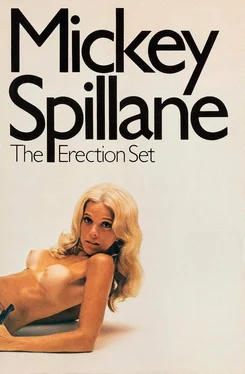
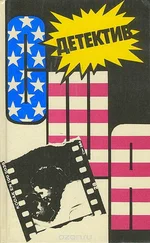

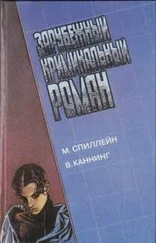
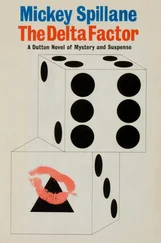
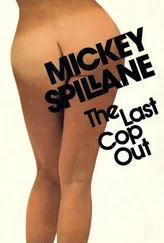
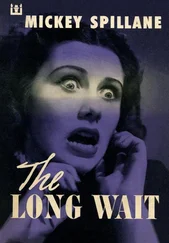
![Микки Спиллейн - Death of the Too-Cute Prostitute [= Man Alone]](/books/437201/mikki-spillejn-death-of-the-too-thumb.webp)